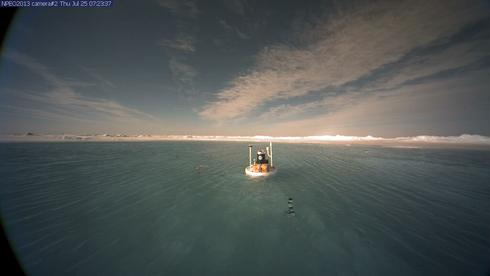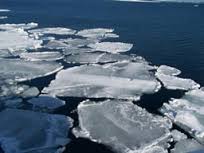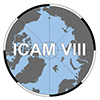|
|
|
|
|
|
|
|
The Face of Climate Change in the Arctic: The National Media's Role in Public Disengagement. May 11, 2018 (Washington, DC USA). Elizabeth Arnold of the Harvard Kennedy School will present this event hosted by the Arctic Research Consortium of the US (ARCUS). More than a decade of national media attention to the human impacts of climate change in the Arctic has largely framed communities as victims to sell the urgency of mitigation to the public. The talk will focus on Arnold's own experience and current research of media coverage to discuss the need for journalism and science communication that includes both threat and efficacy.
|
Media
 What Happens in the Arctic Doesn't Stay in the Arctic. What Happens in the Arctic Doesn't Stay in the Arctic. It turns out the Arctic is not like Vegas. When it comes to climate, what happens in the Arctic does not stay there. Here's your rundown for this week's Climate Cast. Climate changes in the Arctic are happening way faster than predicted just 15 years ago. Jennifer Francis with Rutgers University is one of the leading climate experts on how changes in Arctic climate affect weather where we live. She joins us with the latest from her field. Minnesota Public Radio News
The Race to Save Arctic Cities as Permafrost Melts. In Iqaluit, the capital of e Nunavut, a good home is hard to find. An efficiency apartment runs around $2,000 a month, while a two-bedroom house will cost about $3,500. These New York prices are shocking in a small, remote town of about 7,500 people. And there still aren't enough homes for everyone. Iqaluit expanded rapidly when Nunavut became an official Canadian territory in 1999. Canada's largest territory is home to many Inuit communities; about 90 percent of the territory's residents are indigenous. National Observer
Alaska's North Slope Whalers Bring in Spring Bounty. It was a busy few weeks for North Slope whalers with several crews bringing in whales, or aġvik, within the space of a few days. Because the season is dependent on the migration of the bowhead, it can go from start to finish very quickly, whalers said. "The aġvik has sustained us as a people for thousands of years," Utqiaġvik whaler Herman Ahsoak wrote on Facebook this week. "... When we eat it frozen, aged, freshly boiled or fermented it fills us mind, body and spirit. We must never ever give up when it is time to help other crews in harvesting, butchering and dividing it to feed our people. We must continue to teach our children, grandchildren and great-grandchildren how important it is to our survival. Let us all finish this spring season strong." Anchorage Daily News
 The Slipperiness of Ice Explained. The Slipperiness of Ice Explained. Everybody knows that sliding on ice or snow, is much easier than sliding on most other surfaces. But why is the ice surface slippery? Researchers have now shown that the slipperiness of ice is a consequence of the ease with which the topmost water molecules can roll over the ice surface. Science Daily
|
|
Future Events
** New this week ** Shaping Alaska's Climate Policy: A Conversation with Alaska's Lt. Governor Byron Mallott, May 15, 2018 (Washington, DC USA). This event is sponsored by the Wilson Center. Alaska is warming at twice the rate as the rest of the United States and is already experiencing adverse impacts from climate change. Across the state, Alaskans are observing unprecedented environmental changes that threaten their health, safety, culture, and economic security. A 2009 federal report identified 31 coastal villages as imminently threatened by climate change, and agencies suspect that number has increased in recent years. Lt. Governor Mallott will speak to the State of Alaska's response to climate change through the work of the Climate Action for Alaska Leadership team.
Council on Earth Cryology, May 15-16, 2018 (Moscow, Russian Federation). Scientific council on Earth cryology of Russian Academy of Sciences together with Department of Geocryology of Faculty of Geology of Lomonosov Moscow State University, Institute of the Earth Cryosphere, the Tyumen Scientific Senter, Melnikov Permafrost Institute (Yakutsk) of the Siberian Branch of the Russian Academy of Science holds on May 15 - 16, 2018 an enlarged meeting with participation of the Russian and foreign scientists, engineers and experts: "Current problems of geocryology." The meeting of Scientific council on Earth Cryology of RAS has the status of the International meeting. The publication of materials in the collection of reports is planned. Submissions (Submission Form), offers on cooperation, support of a conference and papers (Sample of Paper) to e-mail: cryoconf18@gmail.com
** New this week ** 2018 DOD Arctic Science & Technology Synchronization Workshop, May 16-18, 2018 (Hanover, NH). The 2018 Arctic Science & Technology Synchronization Workshop will be sponsored jointly by Northern American Aerospace (NORAD) US Northern Command (USNORTHCOM) and USD(R&E) to help represent Department of Defense-wide science and technology with Arctic relevance. The event organizers aim for in-depth discussions of military-relevant Arctic S&T and policy, and would like to emerge with a stronger sense of potential requirements for Arctic S&T work as well as strengthened connections for DOD communities, including operational communities, who work in Arctic conditions and conduct research related to them. In-person registration has reached its capacity and is closed.
- Addressing the energy field of the future;
- Defense energy systems in the North;
- Natural hazards and aerospace/defense;
- Empowering Alaska's entrepreneurs;
- Navigating the changing Arctic; and,
- Developing local and global energy solutions.
The Effects of Climate Change on the World's Oceans, June 4-8, 2018 (Washington, DC USA). The 4th International Symposium will bring together experts from around the world to better understand climate impacts on ocean ecosystems - and how to respond. The event is hosted by a variety of groups including International Council for the Exploration of the Sea (ICES), N. Pacific Marine Science Organization (PICES), Intergovernmental Oceanographic Commission of UNESCO (IOC), and Food and Agriculture Organization of the United Nations (FAO).
Vision on Marine Infrastructure, June 11, 2018, 1:00-3:00 pm (Washington, DC)
.
The U.S. Committee on the Marine Transportation System and its Marine Transportation System Federal partners will share their visions and priorities on maritime infrastructure, which refers to physical infrastructure, informational infrastructure (such as aids to navigation, nautical charts, and real-time meteorological and oceanographic services), and mariner needs. Open to the public, but RSVP is required to access the location. Please contact Jaya.Ghosh@cmts.gov by June 6, 2018 to RSVP. See here for additional details.
 POLAR 2018, June 15-27, 2018 (Davos, Switzerland).POLAR2018 is a joint event from the Scientific Committee on Antarctic Research (SCAR) and the International Arctic Science Committee (IASC). The SCAR meetings, the ASSW and the Open Science Conference will be hosted by the Swiss Federal Institute for Forest, Snow and Landscape Research WSL under the patronage of the Swiss Committee on Polar and High Altitude Research. The WSL Institute for Snow and Avalanche Research SLF is organizing POLAR2018. POLAR 2018, June 15-27, 2018 (Davos, Switzerland).POLAR2018 is a joint event from the Scientific Committee on Antarctic Research (SCAR) and the International Arctic Science Committee (IASC). The SCAR meetings, the ASSW and the Open Science Conference will be hosted by the Swiss Federal Institute for Forest, Snow and Landscape Research WSL under the patronage of the Swiss Committee on Polar and High Altitude Research. The WSL Institute for Snow and Avalanche Research SLF is organizing POLAR2018.
** New this week ** From Entering the Field to Taking the Helm, Women's Perspectives on Polar Research, June 20, 2018 (Kongresszentrum Davos, Switzerland). This event is hosted by the Arctic Research Consortium of the United States. The US Arctic Research Commission (USARC) is one of the sponsors of this event. New research findings are shaping our understanding of the issues that women face in technical fields, particularly those with strong connections to fieldwork. Concerns include a deficit of female leadership due to the so-called "leaky pipeline" (e.g., Goulden et al., 2011), a lack of safety and inclusivity at field locations (Clancy et al., 2014; Nelson et al., 2017), and explorations of ways in which research agendas have discounted contributions of women (e.g., Carey et al. 2016). In spite of historical barriers to participation in polar field work, women have made outstanding contributions to polar physical, biological and social sciences, as well as to community-level efforts to coordinate and communicate science. In the past decade, women have stepped into leadership roles at polar institutions. Yet evidence of persistent challenges, reflected both in academic studies and media reports (see Further Resources), compels us to examine the sources of those challenges and to explore solutions to ensure a bright future for all those who wish to engage in polar research.
5th European Conference on Permafrost, June 23-July 1, 2018 (Chamonix-Mont Blanc, France). In the continuation of the International and Regional conferences convened by the International Permafrost Association, the 5th European Conference on Permafrost (EUCOP 2018) will be held in Chamonix-Mont Blanc, France, 23rd June - 1st July 2018. The conference aims at covering all relevant aspects of permafrost research, engineering and outreach on a global and regional level. Conference website: here.
Arctic Observing Summit 2018, June 24-26, 2018 (Davos, Switzerland). The Arctic Observing Summit (AOS) is a high-level biennial summit that provides a platform to address urgent and broadly recognized needs of Arctic observing across all components of the Arctic system. AOS 2018 will be held in Davos, Switzerland ( June 24-26) and will focus on pressing issues in the implementation and support of sustained observations that can be addressed through a business-case lens. To that end, short submissions are requested that address any and all aspects of the overarching theme and sub-themes. Additional information can be found here.
17th International Congress of Circumpolar Health (ICCH17), August 12-15, 2018 (Copenhagen, Denmark). The ICCH congresses are held every third year in different locations in the circumpolar area and represent the largest scientific meetings worldwide on circumpolar health. The ICCH congresses serve as the primary source of information exchange and scholarly communication in issues relating to circumpolar health. More than 750 participants generally register and participate in each Congress, and more than 400 scientific papers or posters are usually presented.
UArctic Congress 2018, September 3-7, 2018 (Oulu and Helsinki, Finland).
The UArctic Congress 2018 will bring together key UArctic meetings and a science conference into one single gathering, including business meetings of the Council of UArctic, Rectors' Forum, Student Forum, and Thematic Networks & UArctic Institutes Leadership Team. The Congress is an integral part of the Finland's Arctic Council chairmanship program, and open to the public. The event will highlight the themes and priorities of the Finnish chairmanship, including the goals of the United Nations' 2030 Agenda for Sustainable Development, and the Paris Agreement under the UN Framework Convention on Climate Change.
Scientific Exploration of the Arctic and North Pacific (SEA-NorP), September 25-27, 2018 (Mt. Hood, Oregon USA). This workshop will include discussion of hypotheses that can be tested by scientific drilling in the region, the technology necessary to achieve those goals, ideal sites for drilling based on existing data, and where additional site survey data is needed. The goal of the workshop organizers is that multiple proposals will be initiated at the workshop, both for full cruise legs and for shorter, targeted expeditions around the following themes: ocean gateways, geohazards, volatile cycling, ice histories at transition zones, biosphere and climate.
The second Arctic Biodiversity Congress is hosted by the Conservation of Arctic Flora and Fauna (CAFF), the biodiversity working group of the Arctic Council, and the Ministry of the Environment, Finland. The second Arctic Biodiversity Congress will build on the success of the first Congress, held in 2014 in Trondheim, Norway, and will bring together scientists, policymakers government officials, Indigenous representatives, Traditional Knowledge holders, industry, non-governmental organizations, and others to promote the conservation and sustainable use of Arctic biodiversity.
|
|

  
4350 N. Fairfax Drive, Suite 510
Arlington, VA 22203, USA
External links in this publication, and on the USARC's World Wide Web site ( www.arctic.gov) do not constitute endorsement by the US Arctic Research Commission of external Web sites or the information, products or services contained therein. For other than authorized activities, the USARC does not exercise any editorial control over the information you may find at these locations. These links are provided consistent with the stated purpose of this newsletter and the USARC Web site.
|
|
|
|
|
|
|
|
|
 What Happens in the Arctic Doesn't Stay in the Arctic. It turns out the Arctic is not like Vegas. When it comes to climate, what happens in the Arctic does not stay there. Here's your rundown for this week's Climate Cast. Climate changes in the Arctic are happening way faster than predicted just 15 years ago. Jennifer Francis with Rutgers University is one of the leading climate experts on how changes in Arctic climate affect weather where we live. She joins us with the latest from her field. Minnesota Public Radio News
What Happens in the Arctic Doesn't Stay in the Arctic. It turns out the Arctic is not like Vegas. When it comes to climate, what happens in the Arctic does not stay there. Here's your rundown for this week's Climate Cast. Climate changes in the Arctic are happening way faster than predicted just 15 years ago. Jennifer Francis with Rutgers University is one of the leading climate experts on how changes in Arctic climate affect weather where we live. She joins us with the latest from her field. Minnesota Public Radio News The Slipperiness of Ice Explained. Everybody knows that sliding on ice or snow, is much easier than sliding on most other surfaces. But why is the ice surface slippery? Researchers have now shown that the slipperiness of ice is a consequence of the ease with which the topmost water molecules can roll over the ice surface. Science Daily
The Slipperiness of Ice Explained. Everybody knows that sliding on ice or snow, is much easier than sliding on most other surfaces. But why is the ice surface slippery? Researchers have now shown that the slipperiness of ice is a consequence of the ease with which the topmost water molecules can roll over the ice surface. Science Daily


